Precise language means a vocabulary of precise nouns and vivid verbs that helps you create strong mental pictures and avoid wordiness. Chinese is not my native language, I have learnt it, now I teach. I found it a precise language by nature. Here I share the beauty of precise Chinese language that you can learn too, piece-by-piece to marvel.
Don't wanna be here? Send us removal request.
Text
Chinese television series on “Republic of China” period (1912 - 1949) 民国剧
The “Republic of China” period generally refers to the period during which the government of the Republic of China effectively ruled Mainland China from 1912 to 1949, after inheriting the Qing Dynasty's legal system. Chinese television series about that period makes a popular stance in nowadays Chinese television film broadcast. Below is some most popular series in this line that are recently released on screen:
1. Spy Hunter (2019) 天衣无缝

Spy Hunter is directed by Li Lu, starring Qin Junjie, Xu Lu, Hu Haifeng, and specially starring Lu Yi, Zhang Zhixi, Zhu Gangriyao, Mo Xiaoqi, Ding Yongdai, Ding Haifeng, Sun Quan, Sun Tianyao starring in an era spy war drama. The series tells the story of a bloody battle in the period of war, where everyone is in danger, and a few aspiring young people have the ideals of defending the motherland and peace. The series premiered on Zhejiang Satellite TV and Jiangsu Satellite TV on January 10, 2019, and was simultaneously broadcast on Tencent Video, iQiyi, Youku, and Mango TV.
《天衣无缝》是由李路执导,秦俊杰、徐璐、胡海锋领衔主演,陆毅特邀主演,张芷溪、朱刚日尧、莫小奇、丁勇岱、丁海峰、孙佺、孙添垚主演的年代谍战剧。该剧讲述了在战火纷飞的年代里,人人自危,几个有抱负的年轻人怀揣着保卫祖国、捍卫和平的理想,浴血奋战的故事。该剧于2019年1月10日在浙江卫视、江苏卫视���播,并在腾讯视频、爱奇艺、优酷、芒果TV同步播出。
In the spring of 1931, the Central Committee of the Communist Party of China established red transportation stations in Shanghai, Guangdong Dapu, Harbin and other cities. The transportation stations are directly under the Central Transportation Bureau. A group of red agents "Ashtray" and "Celadon" tried to establish a new underground route, build secret warehouses, escort important materials from the Central Committee of the Communist Party of China, and escort important underground party intelligence personnel to their destinations. "Tianjin" temporary red station was betrayed by traitors, "Ashtray" Gui Wan sacrificed, and the team members were designed and replaced one by one. Gui Wan’s half-brother Zi Liping meticulously planned a plan of revenge, and set up a plan to draw his brother Gui Yi into the game, and use Gui Yi’s power to solve the mystery. The real "traitor" emerged, and the brothers worked together to eradicate the traitor. Rebuild the red station. Once the mystery of life and death was revealed, it was shocking.
1931年春天,中共中央在上海、广东大浦、哈尔滨等城市建立了红色交通站,交通站直属中央交通局。红色特工“烟缸”与“青瓷”一组人马试图建立一条地下新航线,建立秘密仓库,护送中共中央重要物资及护送地下党重要情报人员抵达目的地。“天津”临时红色交通站遭到叛徒出卖,“烟缸”贵婉牺牲,小组成员一一被设计清换。贵婉同父异母的二哥资历平精心策划了一个复仇大计,设局引其兄贵翼入局,借贵翼之力破解谜团,真正的“叛谍”浮出水面,兄弟同心铲除叛徒,重建红色交通站。生死迷局一旦揭晓,石破天惊。
2. Arsenal Military Academy (2019) 烈火军校

Link to watch: https://www.iq.com/album/arsenal-military-academy-2019-19rri0c58t?lang=en_us
Arsenal Military Academy, a drama in the early Republic of China made in 2019. Starring Xu Kai, Bai Lu, Li Chengbin and Wu Jiayi, iQiyi premiered on August 6, 2019.
《烈火军校》,2019年中国大陆民初剧。由许凯、白鹿、李程彬、吴佳怡领衔主演,爱奇艺于2019年8月6日首播。
The kind and righteous girl Xie Xiang disguised herself as a man, under the name of her deceased brother to enter and study at the Military Academy. She became classmates with the cynical wealthy young Gu Yanzheng and the calm and steady Shen Junshan, and gradually developed into comrades fighting side by side. Under the strict and cruel training at the military academy, Xie Xiang not only worked hard to conceal the secret of disguising herself as a man, but also overcame all the inconveniences in her life as a woman in the military academy. More importantly, she must overcome her weak physique and work hard. Completed all the training in the military academy and graduated successfully. In the process, Xie Xiang and her classmates experienced a series of important events, which also led to a series of funny stories. In the end, Xie Xiang not only achieved outstanding results through her unremitting efforts, but also won the respect of her instructors, and at the same time, she also got the hearts of two outstanding male classmates. After that, the Japanese army increased its troops to Shunyuan, and Oda Xianrong, who admired Shen Junshan, returned from overseas as the president of the Japanese Chamber of Commerce, and a series of conspiracies and traps followed. Xie Xiang fought against the Japanese with the help of her classmates, grew up in the bloody wind, shattered Oda Xianrong's conspiracy, and finally got together with Gu Yanzheng.
善良正义的少女谢襄代兄从军,女扮男装进入烈火军校学习,与玩世不恭的富家子顾燕帧和冷静沉稳的沈君山成为同学并渐渐发展为并肩作战的战友。在军校严格残酷的训练机制下,谢襄不但要努力掩饰自己女扮男装的秘密,还要克服自己作为女性在军校生活中的种种的不便,更重要的,是要战胜自己柔弱的体质,努力完成军校所有的训练,顺利毕业。 在此过程中,谢襄和同窗好友们经历了一系列重大事件,也引发了一系列啼笑皆非的故事。最终,谢襄通过自己的不懈努力不但取得了出色的成绩,还赢得了教官的尊重,同时,也俘虏了两位优秀男同学的心。之后,日本军队增兵顺远,爱慕沈君山的织田显蓉化身日本商会会长从海外归来,一系列的阴谋和陷阱随之而来。谢襄在同学们的帮助下与日本人做斗争,在血雨腥风中逐渐成长,粉碎了织田显蓉的阴谋,并最终和顾燕帧走到了一起。
0 notes
Text
Chinese historical television series 古装片:中国古装电视剧推荐
China has thousand-year long history which is a fertile land for movie-makers to make the most of their creativeness. Chinese historical television series mainly surround the topic of love, war, traditional arts (such as martial arts, calligraphy, opera, musical, water painting, embroideries,...), traditional values, families and dynasties, etc...and convey a deep oriental world-view and philosophy.
Below is an introduction of some series that are released recently and recommendable:
1. The Story of Minglan (2018) 知否知否应是绿肥红瘦 (明兰转)
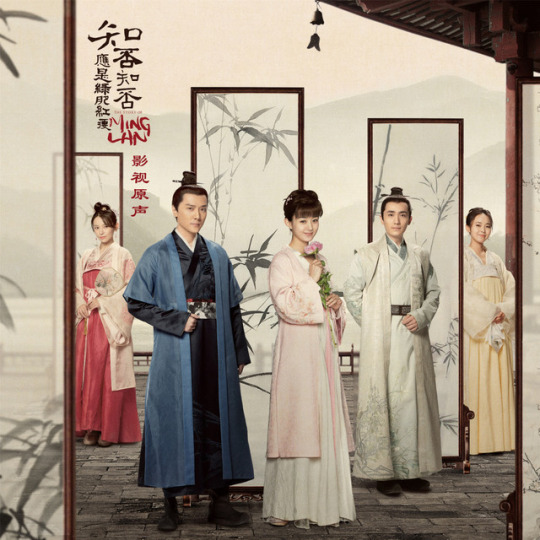
The Story of Minglan is produced by Hou Hongliang, directed by Zhang Kaizhou, screenwriters by Zeng Lu and Wu Tong, starring Zhao Liying and Feng Shaofeng, Zhu Yilong, Shi Shi, Zhang Jianing, Cao Cuifen, Liu Jun, Liu Lin, Gao Lu, Wang Renjun, Li Yixiao, Wang Herun, Zhang Xiaoqian, and Li Hongtao, starred in topic of old social family dramas. The series is adapted from the novel of the same name by Guanxin Zeluan. Through the growth, love and marriage story of Minglan, a girl from a mandarin family in the Northern Song Dynasty, it unfolds the life of a girl from the boudoir to the head woman of mandarin’s inner home and family, depicts a legend of female struggle under the old system. The series premiered on Hunan Satellite TV’s Golden Eagle Exclusive Theater on December 25, 2018, and was simultaneously broadcast on iQiyi, Tencent Video, Youku Video, and YouTube. In May 2019, it was shortlisted for the Best Chinese TV Series in the Magnolia Award of the 25th Shanghai TV Festival. In February 2020, it was selected into the "Selected Works of Chinese TV Series 2019" recommended by the State Administration of Radio and Television. On October 18, it won the 30th China TV Golden Eagle Award for Outstanding TV Series.
《知否知否应是绿肥红瘦》是由侯鸿亮担任制片人,张开宙执导,曾璐、吴桐编剧,赵丽颖、冯绍峰领衔主演,朱一龙、施诗、张佳宁、曹翠芬、刘钧、刘琳、高露、王仁君、李依晓、王鹤润、张晓谦、李洪涛主演的古代社会家庭题材剧。该剧改编自关心则乱同名小说,通过北宋官宦家庭少女明兰的成长、爱情、婚姻故事,展开了一幅由闺阁少女到侯门主母的生活画卷,讲述一个家宅的兴荣,古代礼教制度下的女性奋斗传奇。该剧于2018年12月25日在湖南卫视金鹰独播剧场首播,并在爱奇艺、腾讯视频、优酷视频、YouTube同步播出。2019年5月,入围第25届上海电视节白玉兰奖最佳中国电视剧。2020年2月,入选国家广播电视总局推荐的《2019中国电视剧选集》。10月18日,获得第30届中国电视金鹰奖优秀电视剧奖。
Ming Lan (Zhao Liying), the sixth daughter of the Sheng family, was smart and beautiful since she was a child. She hides her intelligence, bury her edge, grows up with the humiliation and burden of adversity, and is still self-reliant and self-reliant under all kinds of oppression, and finally goes through the hardships to avenge her mother. In this process, Minglan met Gu Tingye (Feng Shaofeng), the second son of Ningyuan Marquis family. Gu Tingye has helped Minglan, and he has also been mean to Minglan. He has seen Minglan's intelligence and sharpness under her weak skin, and also the fragility and loneliness in her strong character, and he has long been enamored with her. The court was changing. Under the support of Gu Tingye, the descendants of the branch of the Zhao family were established as crown prince. Gu Tingye took the edict of the king of Qin and defeated the rebels. Then he supported the new emperor and became the highest-ranking mandarin in the new dynasty. By a tricky plan, he succeeded to take Minglan as wife. After marriage, Minglan became the head of inner family, rectified the Marquis house, shoveled the treacherous relatives, and removed the bad, the two husband and wife resolved misunderstandings and established a deep relationship. In the end, Minglan and her husband assisted the emperor to consolidate political power, and the two also reaped a happy life.
盛家六姑娘明兰(赵丽颖饰)从小聪颖貌美,却遭遇嫡母不慈,姐妹难缠,父亲不重视,生母被害去世的困境。她藏起聪慧,掩埋锋芒,忍辱负重逆境成长,在万般打压之下依然自立自强,终历尽艰难为母报仇。在这一过程中,明兰结识了宁远侯府二公子顾廷烨(冯绍峰饰)。顾廷烨帮过明兰,也刻薄过明兰,他见过明兰软弱表皮下的聪慧锐利,也见过她刚强性格中的脆弱孤单,对她早已倾心。朝廷风云变幻,在顾廷烨的拥戴下,赵家旁支宗室子弟被立为太子,顾廷烨拿着勤王诏书,大破反贼,而后拥立新帝,成为新朝第一功臣,略施巧计娶了明兰为妻。明兰婚后管家业、整侯府、铲奸佞、除宵小,夫妻二人解除误会建立了深厚的感情,最终明兰与丈夫一同协助明君巩固政权,二人也收获了美满的人生。
2. Under the power (2019) 锦衣之下

Link to watch: https://www.iq.com/play/under-the-power-episode-1-19rw1wdtz8?lang=en_us
The 2019 Chinese mainland historical series, set in the Ming Dynasty, is an adaptation of the novel of the same name by author Lan Se Shi. Starring Ren Jialun, Tan Songyun, Han Dong, Ye Qing, Lu Hong, Yao Yichen, it premiered on iQiyi and Mango TV on December 28, 2019. Broadcast on LINE TV, LiTV online video and other online platforms.
2019年中國大陸古装剧,故事背景为明朝,蓝色狮的同名小说改编。由任嘉伦、谭松韵、韩栋、叶青、路宏、姚奕辰领衔主演,于2019年12月28日在爱奇艺和芒果TV首播。LINE TV、LiTV 線上影視等網路平台播出。
Yuan Jinxia (played by Tan Songyun), a talented female arrester of Lu Shan Men, through a case has formed a good connection with the ruthless Royal guard Lu Yi (played by Ren Jialun). Jinxia originally thought she would have no intersection with him in this life, but really fate find people on a narrow road. The imperial court's 100,000 liang money for reinforcing the dikes disappeared. Jinxia was ordered to assist Lu Yi to go to Yangzhou to investigate the case and retrieve the lost official money back for the Imperial Court. Originally, their differences separate them, later the shocking and secret case made them naturally join forces. The two of them went from water vs fire situation to admiration and then to the affliction. The gears of fate have since rotated together. However, things do not follow people’s wish. Jinxia was revealed the survived orphan grand-daughter of Xia Ran's case the other former years. With family blood feuds on her, there was an insurmountable big division between Jinxia and Lu Yi. In the end, the two lovers went through hardships. In order to save the common people, fight against Japanese pirates, and eliminate traitors, the two put aside family grudges, joined forces against the enemy, broke through the shackles of the world, and came together bravely.
天赋异禀的六扇门女捕快袁今夏(譚松韻飾)因为一桩案件和性情狠辣的锦衣卫陆绎(任嘉倫飾)结下梁子,今夏本以为此生与他再无交集,奈何冤家路窄。朝廷十万两修河款不翼而飞,今夏奉命协助陆绎一起下扬州查案,替朝廷找回丢失的官银。本是道不同不相为谋,却因���天密案联手。两人从势同水火到刮目相看再到情难自已,命运的齿轮从此旋转在一起。然而事与愿违,今夏竟是当年夏然案的遗孤,背负家族血仇的她与陆绎之间横生了无法跨越的鸿沟。最后,两个有情人历经苦难,为救百姓、抗倭寇、除奸佞,放下家族仇怨,联手对敌,冲破世俗枷锁,勇敢地走到了一起。
3. The Sword and The Brocade (2021) 锦心似玉
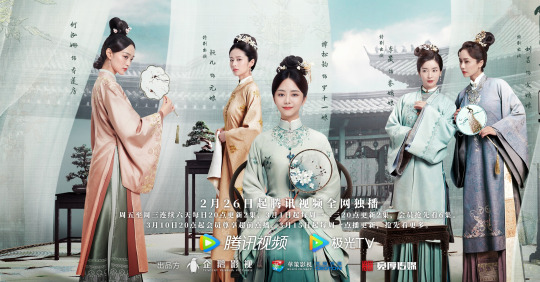
Link to watch: https://www.iq.com/play/the-sword-and-the-brocade-episode-1-l7dhqgu4mc?lang=en_us
The Sword and the Brocade is a historical series directed by Wen Deguang and Yang Xiaobo, starring Zhong Hanliang and Tan Songyun, starring He Hongshan and Tang Xiaotian, and especially starring Ying’er, Li Sheng and Liu Yun. The play is adapted from Zhizhi's novel "The Concubine's girl Guide". It tells the inspirational love story of Yongping Marquis General Xu Lingyi and the concubine Shiyi Niang who married first and loved together later, with background in the Ming Dynasty. The series premiered on Tencent Video on February 26, 2021, and was broadcast simultaneously in Thailand, Japan, South Korea, the Philippines, Indonesia, Spain, and Vietnam.
《锦心似玉》是由温德光、杨小波执导,钟汉良、谭松韵领衔主演,何泓姗、唐晓天主演,颖儿、李晟、刘芸特别出演的古装剧。该剧改编自吱吱小说《庶女攻略》,讲述了明朝中期永平侯大将军徐令宜和庶女十一娘先婚后爱、携手成长的励志爱情故事。该剧于2021年2月26日在腾讯视频首播,泰国、日本、韩国、菲律宾、印尼、西班牙、越南同步播出。
During the Ming Dynasty, the concubine’s girl Luo Shiyi niang (played by Tan Songyun) was humble but very assertive. She believed that women's vision should not be limited to the inner house. She hoped to rely on her exquisite embroidery skills to strive for the freedom of life she yearned for. After accidentally marrying Yongping Marquis General Xu Lingyi (played by Zhong Hanliang), she treats everyone around her with an optimistic and positive attitude, relying on her hard work to gain the trust of Xu family and regain her position as the Head of House. Xu Lingyi was attracted by the various beautiful qualities of Shiyi Niang, gradually moved by her. The two were living through many twists and turns, became in love with each other after married. With the support of her husband, Shiyi Niang opened the Xianling Pavilion of the Embroidery Workshop and worked hard to pass on the embroidery skills. Meanwhile Yongping Marquis Xu Lingyi, in order to maintain the peace of his homeland and improve people's livelihood, supported the opening and lifting of sea ban, and therefore experienced many difficulties. When the Xu family was facing the terrible disaster of ransacking and extermination, the husband and wife worked together to resolve the crisis and successfully protected the Xu family. Finally, the opening and lifting of sea ban was successfully promoted. Since then, maritime trade has prospered and the coastal people lived and worked in peace and contentment. The couple fell in love with each other, believed in each other, insisted on what they loved, faced the ups and downs of life together, and wrote their legendary life.
明朝年间,庶女罗十一娘(谭松韵饰)虽地位卑微却极有主见,认为女子眼光不应局限于内宅格局,她希望能凭靠精湛的刺绣技艺争取所向往的自由人生。意外嫁给永平侯大将军徐令宜(钟汉良饰)后,她用乐观积极的心态对待身边的每一个人,依靠努力收获徐家上下的信任,重新执掌中馈。徐令宜被十一娘的种种美好品性而吸引,继而为之动心。两人几经周折情愫暗生,先婚后爱相知相许。在丈夫的支持下,十一娘开绣坊仙绫阁,努力传承刺绣技艺。而永平侯徐令宜,为维护家国安宁,改善民生,力挺开放海禁,经历重重困难。在徐家面临抄家灭族的滔天巨祸之时,夫妻齐心合力化解危局,成功护徐氏一族周全,最终促成开放海禁,至此海上贸易繁荣昌盛,沿海百姓安居乐业。夫妻二人情投意合,相信彼此,坚持所爱,一起面对人生风雨,书写了属于他们的传奇人生。
1 note
·
View note
Text
Book introduction: Very fun Chinese handicraft toys collection that build fine skills for kids --《民间手工玩具》
A book on Chinese handicraft toys collection that build fine skills for kids --《民间手工玩具》
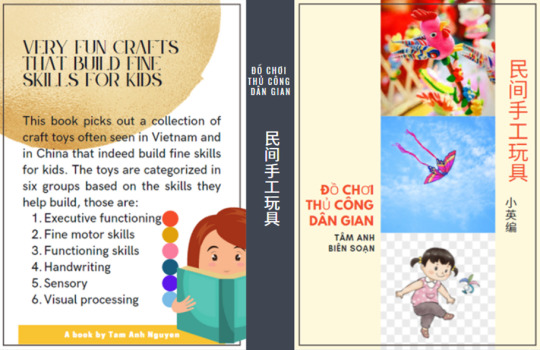
https://www.canva.com/design/DAEsO-qkAhY/zNQDCAKmJyRFQCPnOfAcBA/view?utm_content=DAEsO-qkAhY&utm_campaign=designshare&utm_medium=link&utm_source=publishsharelink
0 notes
Text
Book introduction: “A brief introduction into Chinese food” 《中国菜简介》
Bilingual book on Chinese cuisine: “A brief introduction into Chinese food” 《中国菜简介》 . In English and Chinese language. Compiled, translated & edited by Tam Anh Nguyen, October 2021.

https://www.canva.com/design/DAErS2M3CKk/4VrJ1GkqeXtaZDK6a14Gdw/view?utm_content=DAErS2M3CKk&utm_campaign=designshare&utm_medium=link&utm_source=publishsharelink
0 notes
Text
Book introduction: Sanmao’s “Stories of the Sahara” 《撒哈拉的故事》三毛著,1976。
《撒哈拉的故事》是一系列以沙漠为背景的故事。 因为一本地理杂志的��引,三毛背着行囊走进了荒凉单调的撒哈拉沙漠,在沙漠中寻找感受生活的真善美,书中每个故事都充溢着一种浪漫、浓情的异域情调,字里行间反映着大沙漠独有的地形地貌与风土人情。
“Stories of the Sahara” is a series of stories with desert as backdrop. Being attracted by an article in a geography magazine, Sanmao with her backpack on, has travelled into the isolated and monotonous Sahara desert, found her authentic feelings for life in the beautiful desert. In this book, each story is filled with passionate exotic ambience and sentiments; unique geography and local customs of great desert are well depicted in each word and paragraph.
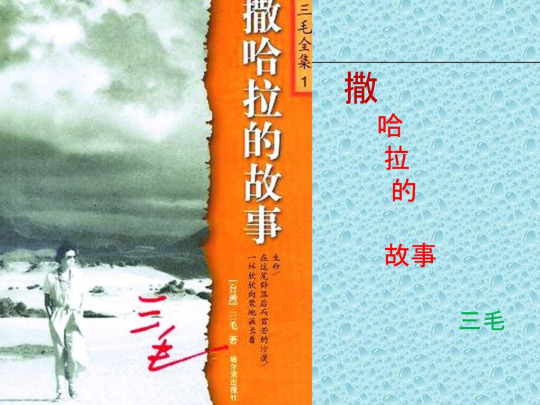
目 录 Contents
妈妈的一封信(代序)A letter from Mum (Forewords)
回乡小笺(四版代序)Small note on returning to home-country (Forewords on 4th edition)
沙漠中的饭店 Restaurant in the desert
结婚记 Marriage chronicle
悬壶济世 Practise medicine save people
娃娃新娘 Child bride
荒山之夜 Night in the isolated mountain
沙漠观浴记 Observation note on desert bathing
爱的寻求 A seek for love
芳邻 Good neighbour
素人渔夫 Amateur fishing man
死果 Death enchantment
天梯 Stairway to heaven
白手成家 Empty hands make home
三毛一生大事记 Sanmao’s life events
0 notes
Text
DAY 40
江南园林 [ Jiāngnán Yuánlín ]
Chinese traditional pavilion in south Yangtze river region
江南 [jiāng nán] indicates the region located south of the lower reaches of the Changjiang (Yangtze) River, including southern part of Jiangsu province and Anhui province, and northern part of Zhejiang province.
长江下游以南的地区,就是江苏、安徽两省的南部和浙江省的北部。
园林 [yuán lín] pavilion, a complex of garden and building, and housing.

Chinese pavilion 园林 is generally classified into two types, those are [1] 皇家园林 [ huángjiā yuánlín ] feudal period royal palace gardens and [2] 私家园林 [ sījiā yuánlín ] gardens inside mandarin’s private residential complex. Most well-known Jiangnan pavilions are those in 苏州 Suzhou, 无锡 Wuxi, 杭州 Hangzhou, and 南京 Nanjing.
Jiangnan pavilions architecture represents most distinguishable Chinese traditional architecture. The pavilions are created by meticulous crafting of beautiful landscape and drawings and integrated within it deep intellectual meanings.

The below are typical architectural components in a Chinese traditional pavilion complex:
台 [ tái ] tower
亭 [ tíng ] shelter with roof and no wall, an arbor
榭 [ xiè ] 水榭 [ shuǐ xiè ] building often part or whole on water
楼 [ lóu ] building of one or multi-storey
阁 [ gé ] attic
堂 [ táng ] chamber
厅 [ tīng ] foyer, hall
馆 [ guǎn ] house
轩 [ xuān ] veranda
廊桥 [ láng qiáo ] roofed bridge
Typical crafted landscapes inside pavilion include:
(假)山岛 [ shān dǎo ] replica mountain and island
荷池 [ hé chí ] lotus pond
松冈 [ sòng gāng ] pine hill
竹坞 [ zhú wù ] bamboo valley
树木 [ shū mù ] trees and plants
石碑 [ shí bēi ] stone sign-board
Private pavilions are home of wealthy mandarins in the past. They are often behold by the owner as a place for 归田园居 [ guì tián yuán jū ] return-to-field-and-garden-living, a place to enjoy happy home life closer to nature after and away from the hustle and bustle of active political mandarin life.
Inside the pavilion complex, there are rooms and places for living and leisure activities:
茶室 [ chá shì ] tea room
约客 [ yuè kè ] place for receiving guests
休憩 [ xiū qì ] sleep and rest
宴待宾客 [ yàn dài bīn kè zhī suǒ ] place for feasting and receing guests
听戏唱曲的场所 [ tīng xì chàng qǔ de chǎng suǒ ] traditional plays and performance stage
赏花赏月之所 [ shǎng huā shǎng yuè ] place for enjoying flowers and moon
Inside pavilion architecture components, detailed decorations are meticulously crafted. Often seen are
匾额 [ biǎn’é ] horizontal signboard (wooden)
木雕 [ mù diào ] wooden sculpture
花窗 [ huā chuāng ] flower-pattern decorated windows
(Adapted from original Chinese book 细说江南园林 authored by 孙旭 Sun Xu, published by 当代中国出版社 Contemporary China Publishing House, in 2009. Illustrated images by Tam Anh Nguyen.)
0 notes
Text
DAY 39
忆江南三首。唐诗。白居易。
Thinking of Jiangnan. Poem by Táng Dynasty poet Bai Juyi (772 AD - 846 AD)
江南 [jiāng nán] indicates the region located south of the lower reaches of the 长江 Chángjiāng (Yangtze) River, including southern part of 江苏 Jiāngsū province and 安徽 Anhuī province, and northern part of 浙江 Zhèjiāng province.
长江下游以南的地区,就是江苏、安徽两省的南部和浙江省的北部。

[1]
江南好,风景旧曾谙。日出江花红胜火,春来江水绿如蓝。能不忆江南?
Jiāngnán hǎo, fēngjǐng jiù céng’ān. Rì chù jiāng huā hóng shēng huǒ, chūn lái jiāng shuǐ lv rú lán. Néng bù yì Jiāngnán?
Wonderful Jiangnan, landscape is old to become familiar already. At sunset, flowers on the lake is fiery blooming, in spring the lake becomes as green and glamorous as surrounding plants. Could these not be in my memory?
[2]
江南忆,最忆是杭州。山寺月中寻桂子,郡亭枕上看潮头。何日更重游!
Jiāngnán yì, zuì yì shì Hángzhōu. Shān sì yuè zhōng xún guìzǐ, jūn tíng zhěn shàng kàn cháo tóu.
Thinking of Jiangnan, mostly remember Hangzhou that place. Wandering among mountains and temples in moonlight we look for the cinnamon tree, resting on the pillow in the verandah overlooking waves on the lake. When we could travel there once again?
[3]
江南忆,其次忆吴宫。吴酒一杯春竹叶。吴娃双舞醉芙蓉。早晚复相逢!
Jiāngnán yì, qí cì yì Wú Gōng. Wú jiǔ yī bēi chūn zhú yè. Wú wá shuāng wǔ zuì fúróng. Zǎowǎn fù xiāng féng!
Thinking of Jiangnan, next is remembering Wu Gong (*site in Suzhou). Drinking a glass of Wu Gong Chun Zhu Ye (*Spring bamboo leaves) wine. Viewing Wu Gong dance performance as intoxicating beautiful hibiscus flowers. When we meet again?
(忆江南三首。唐诗。白居易。)
0 notes
Text
DAY 38
THE ART AND CRAFT OF CHINESE PAPERCUT
民间剪纸
Papercut 剪纸 [ jiǎn zhǐ ] is one of the various folk arts and crafts in China, also seems to be the most distinguisable countryside art form. It is as old as the history of making paper 纸 [ zhǐ ] in China, dates back to the Eastern Han Dynasty (25- 220 AD). Before paper, made from plant-fiber, people wrote mainly on bamboo slips or silk.

The techniques of cutting out artistic patterns existed even before the invention of paper and the using of paper as material to make papercut. With the development of paper-making, papercut has become popular and developed to art, mostly popular among common people 民间 [ mínjiān ] in rural countryside or in small towns small cities - but not among the elite mandarin class - thus papercut can be regarded as a type of pop art and craft 民间工艺 [ mínjiān gōngyì ].
Papercut is used as decorative piece on everyday items, such as on gifts 礼品 [ lǐ pǐn ] - called 礼花 [ lǐ huā ], attached on window pane - called 窗花 [ chuāng huā ], or on lanterns - called 灯花 [ dēnghuā ], happy events and holidays lucky decoration - called 喜花 [ xǐhuā ], funerals decor - called 丧葬花 [ sāng zàng huā ], etc 等等 [ děng děng ] ...
The images appeared out of papercut are shadow images 影像 [ yǐng xiàng ] or 影子 [ yǐng zi ] the shadow, therefore carry the attributes of nothingness/ emptiness- and- truthfulness/ reality- together- complement 虚实相生 [ xū shí xiāng shēng ], black- and- white- disentangled 黑白分明 [ hēi bái fēnmíng ].
Papercut uses various types of paper as material, use knife 剪刀 [ jiǎn dāo ] to cut out image on paper. Regarding techniques, there are 阳刻 [ yáng kè ] and 阴刻 [ yīn kè ]. In 阳刻 the main image is captured by continuing lines of paper 正形为实 [ zhèng xíng wéi shí ], 负形为虚 [ fù xíng wéi xū ] the background is the removed paper. In 阴刻 the main image is captured by the emptiness left after removing paper, the background is the largely remained paper not cut out.
Papercut is popular in 山西 [ Shānxi ],山东 [ Shāndōng ],陕西 [ Shaanxi ], 甘肃 [ Gānsu ] in the north of Yellow River Cultural Region 黄河文化圈 [ Huáng Hé Wénhuà Juān ], and 广东潮州 [ Guǎngdōng Cháozhōu ],江苏南京 [ Jiāngsū Nánjīng ],扬州 [ Yángzhōu ] in the south.
(Shortened, translated, edited from original Chinese book 中国民间美术第二章 authored by 钟茂兰 Zhong Maolan and 范朴 Fan Po, published by 中国纺织出版社 China Textile and Apparel Press, in 2003. Illustrated images by Tam Anh Nguyen)
0 notes
Text
DAY 37
CHINESE MODERN LOGO DESIGN
youtube
logo 设计 [ shèjì ] logo design 订单 [ dìngdān ] order
收到一个订单 [ shòu dào yí gē dìngdān ] received an order
收到一个logo 设计订单 [ shòu dào yí gē logo shèjì dìngdān ] receive an order (for logo design)
名称 [ míngchēng ] name
阿拉丁 [ a là dīng ] Aladin
名称叫阿拉丁 [ míngchēng jiào ] name is Aladin
英文名叫 [ yīngwén míng jiào ] English name is
行业 [ hángyè ] industry
美容 [ měiróng ] beauty care (industry)
蛋糕店 [ dāngāo diàn ] bakery (蛋糕 cake) (店 shop, store)
音乐 [ yīnyuè ] music
要求 有 (包括)[ yàoqíu ] [ yǒu ] [ bàokuò ] requirements (include)
客户 [ kèhù ] customer, client 说 [ shuō ] say, said...
要 [ yào ] need (to be...)
安排 [ ānpái ] arrangement
完成 [ wánchéng ] completed
有创意 [ yǒu chuàngyì ] creative
我喜欢 [ wǒ xǐhuān ] I like it
0 notes
Text
Listen to the most recent episode of my podcast: The-precise-chinese-1 https://anchor.fm/tam-anh-nguyen/episodes/The-precise-chinese-1-e13t0fg
0 notes
Text
DAY 36
Listen to the most recent episode of my podcast: The-precise-chinese-1 https://anchor.fm/tam-anh-nguyen/episodes/The-precise-chinese-1-e13t0fg
听众朋友们,大家好!欢迎各位来到由精确汉语播送的节目第一篇。我叫小英。
Tīng zhòng péngyǒumen, dàjiā hǎo! Huānyíng gē wèi lái dào yóu jīngquè hànyǔ bōsòng de jiémù dì yì piàn. Wǒ jiào Xiǎo Yīng.
今天我们将练习汉语语音。
Jīntiān wǒmen jiāng liànxí hànyǔ yǔyīn.
为了帮助您加一份熟悉汉语语音和声调,我将给大家慢慢读一首诗,叫做 “黄鹤楼送孟浩然之广陵。
Wèi le bāngzhù nín jiā yì fēn shúxī hànyǔ yǔyìn hé yǔdiào, wǒ jiàng gěi dàjiā màn màn dú yì shǒu shī, jiào zuò “Huáng hè lóu sòng Mèng Hàorán zhī Guǎnglíng.
这是1291 年之前由唐代诗人李白写出的一首诗。
Zhè shì 1291 nián zhī qián yóu Táng dài shī rén Lǐ Bái xiě chù de yì shǒu shī.
故人西辞黄鹤楼,Gù rén xī cí Huáng Hè Lóu,
烟花三月下扬州。Yān huà sān yuè xià Yángzhōu.
孤帆远影碧空尽,Gū fān yuǎn yǐng bì kòng jìn
惟见长江天际流。Wéi jiàn Cháng Jiāng tiān jì líu.
Meaning:
老朋友在黄鹤楼和我告别,[ Lǎo péngyǒu zài Huáng Hè Lóu hé wǒ gào bié ]
Old friend leaving from west the Yellow Crane Tower.
在百花盛开的春天去扬州。[ Zài bǎi huà shèngkāi de chūntiān qù Yángzhōu ]
Misty clouds of March blossoms on the way to Yangzhou.
孤船帆影渐渐在远天隐没,[ Gū chuán fán yǐng jiànjiàn zài yuǎn tiān yǐn mò ]
Solitary sail reflected in the distance, then disappeared into the bluish-green skyline.
只见悠悠长江向天际奔流。[ Zhǐ jiàn yōuyōu Cháng Jiāng xiàng tiānjì bēn líu ]
Only see the Yangtze River flow to the end of the sky.
0 notes
Text
DAY 35
比 [ bǐ ] compared to
A 比 B + [1] an adjective used as the criteria for comparison + [2] how much the difference.
Examples:
他比我大几岁。[ Tā bǐ wǒ dà jǐ suì. ]
He is some years senior than me.
今天比昨天热得多。[ Jīntiān bǐ zuótiān rè dé duō. ]
Today is much hotter than yesterday.
A do something + 得 + 比 + B + [1] an adverb used as the criteria for comparison + [2] how much the difference.
她行动得比我快一点儿。[ Tā xíng dòng dé bǐ wǒ kuài dé hěn. ]
She acts a little faster than I do.
A 和 [ hé ] and B + the same 一样 [ yì yàng ]
A 和 [ hé ] and B + not the same 不一样 [ bù yì yàng ]
A 跟 [ gēn ] with B + the same 一样 [ yì yàng ]
A 跟 [ gēn ] with B + not the same 不一样 [ bù yí yàng ]
你们那儿跟这儿一样。[ Nǐmen nàr gēn zhèr yì yàng. ]
You there and here are the same.
他们都是一样吗?[ Tāmen dōu shì yì yàng ma? ]
They are the same, aren’t they?
The most 最 [ zuì ]
对我来说,他是最好的。[ Duì wǒ lái shuō, tā shì zuì hǎo de. ]
To me, he is the best.
你吃醋了。
Nǐ chī cù le.
You are jealous. (吃醋 [ chī cù ] eat vinegar = envy, jealous).
0 notes
Text
DAY 34
HOMOPHONES AND THE SECRET LANGUAGE AMONG YOUNG CHINESE PEOPLE
A homophone is a word that sounds the same, or closely pronounced, as another word but has a different meaning and spelling. For examples, flower/ flour, know/ no, dear/ deer, ship/ sheep, are homophones. Some people like to create playful, cute conversation by using homophones. Chinese language has the same way of using homophones, one of which is homophones of words indicating numbers. These are used in sms among young people; and to a lesser extent by everyone in some superstitious interpretation and implication such as the choice of car plate numbers, and personal phone numbers, in which certain numbers mean luck and others not. The below basics give you an understanding into what cute messages a seemingly meaningless series of numbers could meant to be by young Chinese people.
0 零 [ líng ] for 你 [ nǐ ] you
1 一 [ yì ] for 要 [ yào ] want
2 二 [ èr ] for 爱 [ ài ] love, or 饿 [ è ] hungry
3 三 [ sān ] for 想 [ xiǎng ] miss, or 生 [ shēng ] life
4 四 [ sì ] for 死 [ sǐ ] die/ death, or 世 [ shì ] world, or 思 [ sì ] thinking of
5 五 [ wǔ ] for 我 [ wǒ ] I/ me
6 六 [ lìu ] for 了 [ le ] then (in exclamation)
7 七 [ qī ] for 亲 (吻) [ qīn ] kiss, or 请 [ qǐng ] invite
8 八 [ bā ] for 发 [ fā ] prosper, or 抱 [ bāo ] embrace, or 吧 [ ba ] then (in exclamation)
9 九 [ jǐu ] for (永)久 [ jǐu ] forever, or (请) 求 [ qíu ] please (in asking for something)
For examples:
1314 for 一生一世 [ yì shēng yì shì ] the whole life
1314920 for 一生一世就爱你 [ yì shēng yì shì jìu ài nǐ ] the whole life just love you
20110 for 爱你一百一十年 [ ài nǐ yì bǎi yì shí nián ] love you 110 years (love you to the moon and back)
3399 for 长长久久 [ cháng cháng jǐu jǐu ] forever and ever
520 for 我爱你 [ wǒ ài nǐ ] I love you
514 for 无意思 [ wú yì sì ] boring
5366 for 我想聊聊 [ wǒ xiǎng liáo liáo ] I want to talk with you (We need to talk)
5376 for 我生气了 [ wǒ shēng qì le ] I am angry now
6699 for 顺顺利利 [ shùn shùn lì lì ] smoothly
770880 for 亲亲你抱抱你 [ qīn qīn nǐ bāo bāo nǐ ] kiss and embrace you
88 for bye bye
0 notes
Text
DAY 33
忍 Rěn
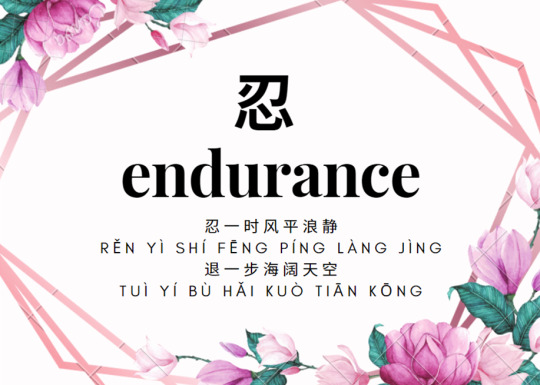
忍一时风平浪静,
Rěn yì shí fēng píng làng jìng
Endure for a moment now, the gale will stop the tide will go.
退一步海阔天空。
Tuì yí bù hǎi kuò tiān kōng.
Surrender one step, ahead will be open sea and sky.
Meaning: Give your way and endure for now, then ahead there will be peaceful and smooth conditions, no more rough stormy sea.
0 notes
Text
DAY 32
IDIOM:
红颜祸水 [ hóng yán huò shuǐ ] Beauty is flood catastrophe.
红 [ hóng ] means red color, 颜 [ yán ] means facial beauty. 红颜 [ hóng yán ] means glamorous facial beauty, connotating beautiful women.
祸 [ huò ] means catastrophe, 水 [ shuǐ ] means water, 祸水 [ huò shuǐ ] means flood catastrophe, which is considered by ancient Chinese as the first and most terrible natural disaster.
红颜祸水 [ hóng yán huò shuǐ ] means beautiful women cause catastrophe.

0 notes
Text
DAY 31
IDIOM: 井水不犯河水 [ jǐng shuǐ bù fàn hé shuǐ ] Well water does not intrude into river water.
Meaning: Each minds each's own business.
我们彼此井水不犯河水。各管各的,互不相犯。
Wǒmen bǐ cǐ jǐng shuǐ bù fàn hé shuǐ. Gē guǎn gē de, hù bù xiāng fàn.
We each mind each's own business.
0 notes
Text
DAY 30
CHINESE TRADITIONAL MUSIC
China nowadays is a dual society where international modern cities such as Shanghai, Beijing - which are not less developed than any other international modern hubs such as London, New York, Tokyo, etc...- prosper alongside traditional societies in rural countryside or small towns and cities.
Chinese soul throughout thousands-of-year history, remains vivid in modern China. It is a solitary soul prone to obscurity in natural landscapes rather than activeness in the hustle and bustle of big cities.
古琴 Gǔqín [ ancient zither ] dates back to 1st millennium BC or earlier, is the most ancient musical instrument in China. It is played and enjoyed by ancient Chinese elite scholar literati class, among the four “schools” 琴 [ qín ] music 棋 [ qí ] chess 诗 [ shī ] literature 画 [ huà ] paintings. The following link from 茶界 Zen Tea (The World of Tea), presents the sound of Guqin.
youtube
0 notes